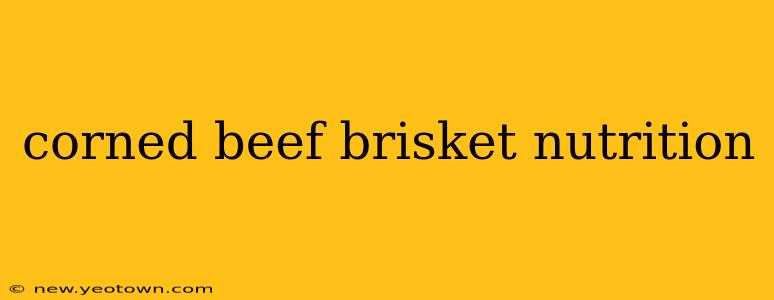Corned beef brisket. The very words conjure images of festive gatherings, St. Patrick's Day celebrations, and hearty, flavorful meals. But beyond the delicious taste and rich tradition, lies a nutritional profile that's worth exploring. This isn't just a celebratory dish; it's a substantial source of various nutrients, albeit with some considerations for mindful consumption. Let's delve into the nutritional details, addressing some common questions along the way.
How Many Calories are in Corned Beef Brisket?
The calorie count in corned beef brisket varies significantly depending on the cut of meat, the cooking method, and the portion size. A typical 3-ounce serving of cooked corned beef brisket can range anywhere from 150 to 250 calories. This seemingly wide range stems from differences in fat content. Leaner cuts will naturally have fewer calories than those with more marbling. Additionally, the way you prepare it – boiled versus slow-cooked – can impact the final calorie count, with added fats from cooking methods contributing to the overall energy density. Always check the nutrition label on pre-packaged products for precise information.
What are the Macronutrients in Corned Beef Brisket?
Corned beef brisket is primarily a source of protein, making it a great choice for those aiming to build and maintain muscle mass. A 3-ounce serving offers roughly 20-30 grams of protein, providing essential amino acids needed for various bodily functions. However, it's also relatively high in fat, particularly saturated fat. The fat content contributes to the richness and flavor but should be considered within a balanced dietary plan. Carbohydrates are minimal in plain corned beef brisket, primarily coming from any added sugars during brining or cooking.
Is Corned Beef Brisket High in Sodium?
Yes, this is a crucial aspect of corned beef brisket nutrition. The brining process, essential for the characteristic flavor and tenderness, involves a high concentration of salt. This leads to a considerably high sodium content. A 3-ounce serving can easily contain 500-800 milligrams of sodium or even more, depending on the preparation method and brand. Individuals with high blood pressure or those watching their sodium intake should be particularly mindful of portion sizes and consider lower-sodium alternatives or preparation methods.
What Vitamins and Minerals are in Corned Beef Brisket?
While not a powerhouse of vitamins and minerals like some fruits and vegetables, corned beef brisket does offer some essential nutrients. It's a good source of niacin (vitamin B3), which plays a vital role in energy metabolism. It also provides some iron, a crucial component of red blood cells. However, the quantities are relatively modest compared to other nutrient-rich foods. Therefore, relying solely on corned beef for your vitamin and mineral needs is not advisable.
Is Corned Beef Brisket Healthy?
The healthfulness of corned beef brisket is a matter of moderation and balance. It's a delicious and protein-rich food, but its high sodium and fat content necessitate mindful consumption. It shouldn't be a staple in a healthy diet but can certainly be enjoyed as part of an occasional, balanced meal. Choosing leaner cuts and adjusting cooking methods can help mitigate some of the health concerns, such as reducing added fats. Ultimately, a healthy diet focuses on variety, and incorporating corned beef brisket should be done in moderation alongside a diverse range of nutrient-rich foods.
How Much Corned Beef Brisket Should I Eat?
There's no single "correct" amount. Portion control is key. A reasonable serving size would be 3-4 ounces, especially considering the high sodium and fat content. Focus on balancing your meal with plenty of vegetables and whole grains to create a more nutritionally well-rounded experience.
In conclusion, corned beef brisket offers a delicious and hearty meal but should be enjoyed responsibly. By understanding its nutritional profile, you can incorporate it into your diet mindfully, enjoying its festive appeal without compromising your overall health. Remember, moderation is key to enjoying this culinary delight as part of a balanced and healthy lifestyle.

